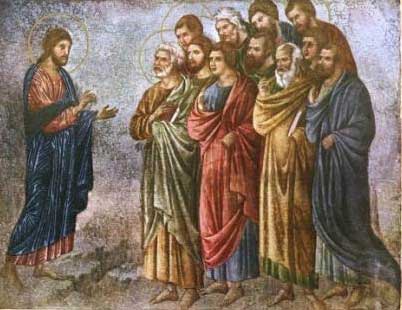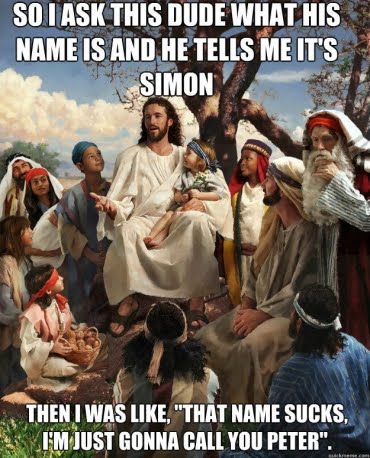22 And the teachers of the law who came down from Jerusalem said, “He is possessed by Beelzebul! By the prince of demons he is driving out demons.”
23 So Jesus called them over to him and began to speak to them in parables: “How can Satan drive out Satan? 24 If a kingdom is divided against itself, that kingdom cannot stand. 25 If a house is divided against itself, that house cannot stand. 26 And if Satan opposes himself and is divided, he cannot stand; his end has come. 27 In fact, no one can enter a strong man’s house without first tying him up. Then he can plunder the strong man’s house. 28 Truly I tell you, people can be forgiven all their sins and every slander they utter, 29 but whoever blasphemes against the Holy Spirit will never be forgiven; they are guilty of an eternal sin.”
30 He said this because they were saying, “He has an impure spirit.”
31 Then Jesus’ mother and brothers arrived. Standing outside, they sent someone in to call him. 32 A crowd was sitting around him, and they told him, “Your mother and brothers are outside looking for you.”
33 “Who are my mother and my brothers?” he asked.
34 Then he looked at those seated in a circle around him and said, “Here are my mother and my brothers! 35 Whoever does God’s will is my brother and sister and mother.”
Footnotes:
b. Mark 3:21 Or his associates
There is so much going on in this passage and it raises so many questions that it is tempting to divide commentary into more than one post. However, since it does seem to be one complete vignette, I am reluctant to separate the different parts from the whole and will try to address the entire passage in one go.
Let's start with the primary tension in the story. Jesus is being accused by both his family and the Teachers of the Law of highly unusual and disruptive behavior that has reached a crisis point. The behavior itself is not explicitly identified in this passage, just the result; crowds gathering around him to the point that it is interrupting the normal business of life such as the ability of he and his disciples to eat. Jesus' popularity and the stir it created was reported earlier in the chapter in verses seven and eight.
7 Jesus withdrew with his disciples to the lake, and a large crowd from Galilee followed. 8 When they heard about all he was doing, many people came to him from Judea, Jerusalem, Idumea, and the regions across the Jordan and around Tyre and SidonSo, large crowds, not only those following him from Galilee, but people who had heard about what he was doing from all over the region and adjoining areas came to him. The crowds had gotten so large and pushy he had the disciples ready a small boat for him to keep the people from crowding him.
The action which drew these large crowds of unruly and pushy people was Jesus' healing and driving demons from so many people.
10 For he had healed many, so that those with diseases were pushing forward to touch him. 11 Whenever the impure spirits saw him, they fell down before him and cried out, “You are the Son of God.”It would be assumed that the disruptive behavior drawing the crowds in this passage is the same, Jesus healing and removing demons from so many people that the news was causing people from all over to flock to him seeking similar help. In this case he enters a house and the crowd which gathers is so great that he and his disciples were unable to eat.
One would think that large scale healing and exorcism for multitudes of people would be something that would be praised and that the individual at the centre of this would be held in esteem with the miracles taken as evidence of God's approval and blessing. This is true in most of the literature of the time and throughout most of the Gospel. Almost all figures being honoured in the writings of the period and region were attributed with performing miracles and similar great acts as a literary device to suggest that the person was favoured by God or the gods and therefore legitimate. So, why in this passage does the author have Jesus' family and the Teachers of the Law view this great outpouring of God's mercy through Jesus as evidence of Jesus having some kind of problem?
Perhaps the Gospel community was highlighting the disruptive nature of the Way of Jesus which they followed and the general resistance in people towards anything that disturbs our usual routines and normal business of life. This seems to be human nature even where the disruption is for something that brings wholeness and freedom like the Gospel. "Sure, people are getting relief from horrible diseases and freedom from mental torment, but it's messing with my normal lunch hour."
 Taken a little further, it often seems to be human nature to pathologize anyone who doesn't conform to expectations for uniformity and order. It is a way to legitimize stripping the non-conformist of their rights to better control their actions so that they do not threaten the privilege of those in power. In this case, Jesus' family attribute his behavior to mental illness while the Teachers of the Law point to demonic possession. This kind of labeling is a way to minimize a person's legitimacy and their right to freedom and independent action. Note that in verse twenty-one the labeling of his action as being the outcome of a mental illness gives Jesus' family excuse or license to take authority over him, to try to take away his self determination and right to decide his own course of action. They, "went to take charge of him, for they said, 'He is out of his mind.'"
Taken a little further, it often seems to be human nature to pathologize anyone who doesn't conform to expectations for uniformity and order. It is a way to legitimize stripping the non-conformist of their rights to better control their actions so that they do not threaten the privilege of those in power. In this case, Jesus' family attribute his behavior to mental illness while the Teachers of the Law point to demonic possession. This kind of labeling is a way to minimize a person's legitimacy and their right to freedom and independent action. Note that in verse twenty-one the labeling of his action as being the outcome of a mental illness gives Jesus' family excuse or license to take authority over him, to try to take away his self determination and right to decide his own course of action. They, "went to take charge of him, for they said, 'He is out of his mind.'"I can imagine why these words in this story might resonate with members of the community who produced the Gospel of Mark. If they were like the early Christian communities described in the book of Acts, they were living as a mixed group of Jews and Gentiles, men and women with no regard to family lineage, social caste, or former wealth. Many had abandoned family connections and duties to live with those who were not family. Many had sold land and possessions which would be considered family resources and surrendered them to this new community. I can picture a number of incidents where family members would have gone to, "take charge", of them, declare them incompetent and make the claim that the giving away of the family's assets would not be legally binding due to mental illness or spirit possession.
44 All the believers were together and had everything in common. 45 They sold property and possessions to give to anyone who had need. 46 Every day they continued to meet together in the temple courts. They broke bread in their homes and ate together with glad and sincere hearts, 47 praising God and enjoying the favor of all the people.
(Acts 2:44-47 NIV)
32 All the believers were one in heart and mind. No one claimed that any of their possessions was their own, but they shared everything they had. 33 With great power the apostles continued to testify to the resurrection of the Lord Jesus. And God’s grace was so powerfully at work in them all 34 that there were no needy persons among them. For from time to time those who owned land or houses sold them, brought the money from the sales 35 and put it at the apostles’ feet, and it was distributed to anyone who had need.
(Acts 4:32-35 NIV)Let's return to the question of why the author has Jesus' family and the Teachers of the Law react to Jesus' miracles and the crowds they draw as something negative and evidence of Jesus having some kind of problem. As I mentioned earlier, the testament of miracles is a common literary device in the period to establish the legitimacy of and authority of a figure. Why is it treated as a negative here? I think it is to further establish another narrative in the Gospel that sought to legitimize Jesus and his teachings by explaining why he was not more popular, recognized and celebrated during his life. Remember that aside from the Gospels which were written generations after his death, Jesus' actions and popularity during life were not enough of a concern to merit any actual public record. The Jewish historian Titus Flavius Josephus writing in that period makes mention of John the Baptist, but Jesus was not noticed or included in his, "Antiquities of the Jews" (despite a later fraudulent addition to the work by Catholic Church historian Eusebius in the fourth century). Josephus and Jesus: The Testimonium Flavianum Question
The narrative being furthered is the, "hardened heart", the idea that the nation as a whole did not recognize Jesus as Messiah, or appreciate his message and actions because their hearts were hardened to God and the message Jesus brought. In this passage this theme is almost brought to the level of farce. You can imagine a listener of the time slamming their palm against their forehead and saying, "How could they call him crazy or demon possessed and not see that he was the Messiah when he was healing all those people and performing all those miracles? What, were they blind?".
Aware of their discussion, Jesus asked them: “Why are you talking about having no bread? Do you still not see or understand? Are your hearts hardened? (Mark 8:17)
He said, “The knowledge of the secrets of the kingdom of God has been given to you, but to others I speak in parables, so that, “‘though seeing, they may not see; though hearing, they may not understand.’ (Luke 8:10)
Next, let's look at Jesus' interaction with the Teachers of the Law. He has already in the story had major run-ins with the local Teachers of the Law who viewed him as undermining their authority and the professional standing of their trade (You can't go around interpreting the Law without the proper certification through religious institution, no matter how popular you may be with the people, it undercuts the exclusivity and monopoly of my trade guild). In the story at the beginning of the chapter where Jesus confronts and negates their interpretation of the Law by healing on the Sabbath, the text says they, "went out and began to plot with the Herodians how they might kill Jesus"(Mark 3:6). As part of this plan, they have now brought in bigger guns in the form of, "teachers of the law who came down from Jerusalem".
The story has these upper level Teachers of the Law from the capitol city try to discredit him by accusing him of having an "impure" spirit, in fact the spirit of Beelzebub, which is from 2 Kings 1:2-3, 6, 16, "Baal of flies", the name of a specific Philistine god which in the narrative the Teachers of the Law identify as the, "prince of demons", giving him the authority to drive out lesser demons. In an earlier post, Impure Spirits? - Mark 1:21-28, I discussed how in the Tanakh, the Hebrew Scriptures, there were no, "demons" in the sense of supernatural beings in opposition to God. What are often referred to are Canaanite or Philistine idols and deities, but in a way to emphasize that they are nothing to fear because they are not really gods and do not "exist". It doesn't seem likely that the author/s of Mark meant for the community listening to this story to take this figure literally. All the more so when the text starts Jesus discussion with his accusers on this by saying that he, "began to speak to them in parables".
So, what is going on here? I believe it is again a story meant to contrast the, "way of spirit" as shown by the community's teaching of Jesus as opposed to the, "way of legalism', as expressed by the mainstream sects of institutional Judaism which they felt opposed their community.
The Teachers of the Law base their teaching on duty as prescribed by the authoritative interpretation and the supplemental guidance of years of Rabbinical tradition and institution. The followers of the way of Jesus base their teaching on the spirit of the Law and of the spirit of God as revealed through the life and teaching of Jesus who characterized God as primarily loving, generous, merciful, and inclusive. Jesus' direction and authority rests on his intimacy with the Spirit of God.
Just as Jesus was coming up out of the water, he saw heaven being torn open and the Spirit descending on him like a dove...
At once the Spirit sent him out into the wilderness (Mark 1:10&12)So, the tact that the story has the Teachers of the Law take is that the spirit that motivates and empowers Jesus is not the Spirit of God, but the Chief Spirit in opposition to God. This is how he has the power to drive out lesser demons.
Jesus refutes this claim with pure logic and gives a parable about how a house divided can not stand. He then makes one of the most inegmatic and often misquoted statement in the Gospels, the one about the unpardonable sin.

28 Truly I tell you, people can be forgiven all their sins and every slander they utter, 29 but whoever blasphemes against the Holy Spirit will never be forgiven; they are guilty of an eternal sin.”However, if we read this statement in the context that we just explored, it makes a lot of sense. It is not the breaking of the Law, religious or social duty that is unforgivable, it is denying the Spirit of God and misusing or desecrating that prompting.
Now we come to the final portion of this vignette. At first it seems like a nonsequitor, but it loops back to the statement at the beginning of the story and the idea just explored.
The beginning of the story had Jesus' family in opposition to him and his ministry, wanting to, "take charge", of him. Here, he is extending the duty and ties of family members to anyone who, "does God's will", denying family special loyalty. We explored earlier why this might resonate with members of the community of Mark. I also explored this theme in the Gospels in the post, Jesus Was Not "Pro-Family" Or "Pro-Nation".
Jesus proclaimed social equality, inclusion, and the indiscriminate nature of God's love which he called us to imitate. As such, Jesus warned us against any cultural, national, or religious division that encourages people to prefer, favour, or give allegiance to some individuals while discriminating against, discounting, or marginalizing others. This included the most powerful social allegiance of his time, family.



















